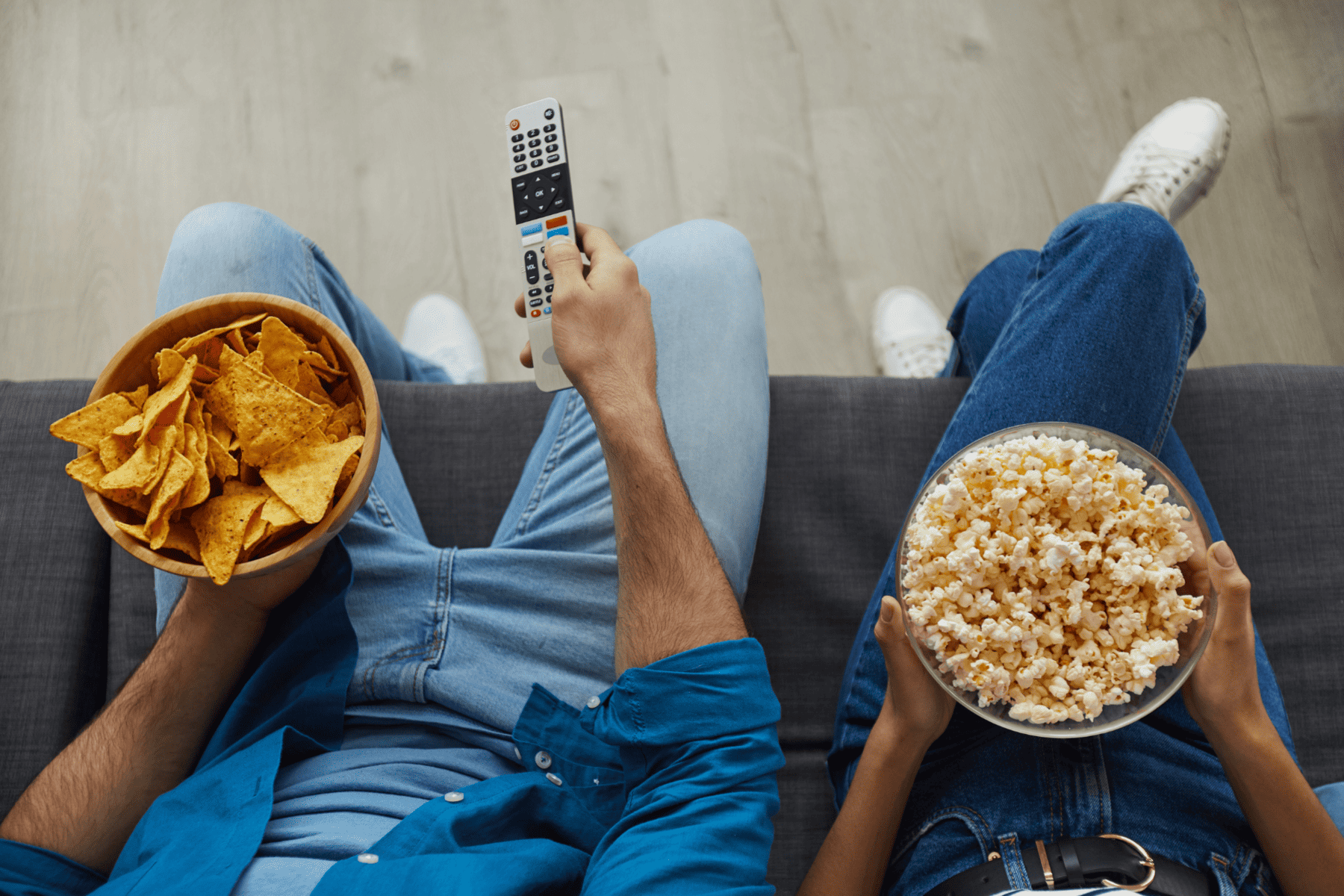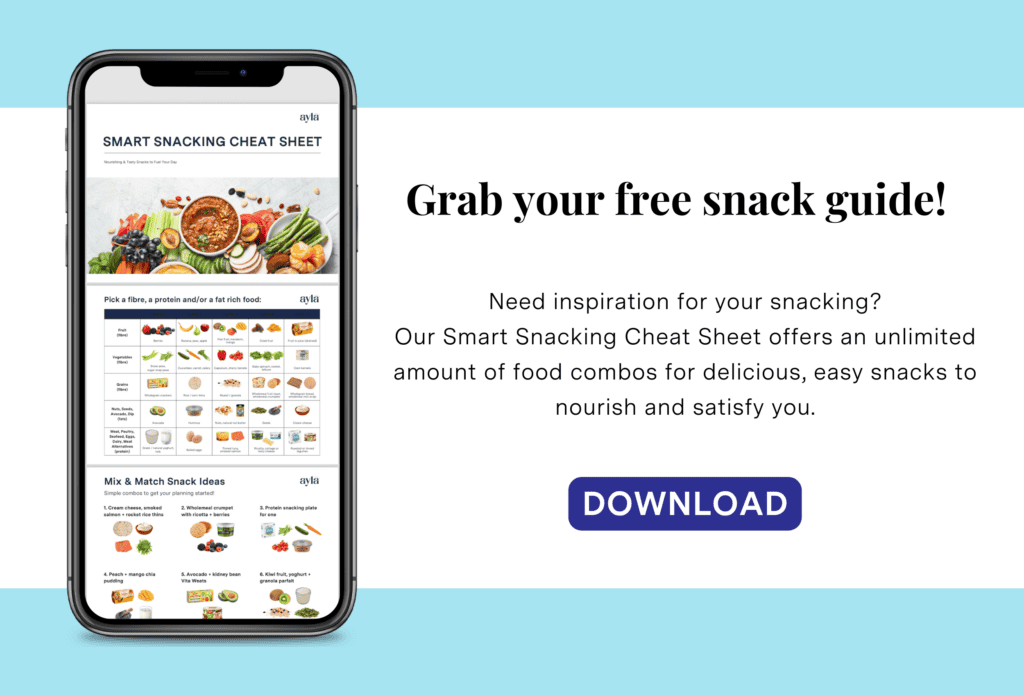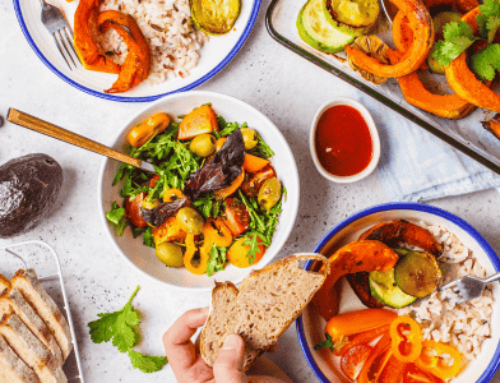Never before in the history of eating have we been afflicted by so much contradictory information on snacking!
Here’s how you should eat if you listen to what has been shared on the internet by various experts:
“Eat regularly, 5-6 small meals per day is good.”
“Snacking is unhelpful, try to stick to two meals per day.”
“Try not to let yourself go too long between eating occasions. No more than 4-5 hours.”
“Snacks are unhealthy.”
“Snacks are an opportunity for nourishment.”
Gah! What are you supposed to believe?
Don’t worry. I’ve got your back. I went digging through the science and found an excellent review paper on snacking and health and summarised the key takeaways below. You might be surprised by what I’ve found:
Whether snacking impairs or promotes health has to do with the types of food selected.
No surprises here! Main takeaway: What you choose to eat is more influential on your health than how often you eat. There are no rules. Find what works for you and your routine.
Much of the research on snacking is inconclusive or contradictory because we all define snacking differently and it’s difficult to control for all the variables.
Ok, so this means we can’t make any hard and fast statements about snacking and it causing something else. If you think about the complexities of life and how we eat, and all the variables that effect this, not to mention all the variables that effect our health, this makes sense. As a result, any black and white, blanket statements about snacks that is shared on the internet is not backed up by evidence. They made it up. The evidence simply does not exist as it’s a difficult topic to study. So all you snack demonisers. Shush!
Snacking leads to an increase in eating frequency.
No surprises here. Most people who snack regularly, eat more frequently across the day!
Existing evidence suggests that increased eating frequency may not compromise diet quality and may be associated with a high nutrient intake. Assessing energy intake and nutritional quality at the individual level is important!
As someone who has been working with individuals on their nutrition for a LONG TIME, this something I’ve frequently recommended based on evidence and it was great to see in this recent review that this is still the case.
Main take home message: See snacking as an opportunity for nourishment and a way to get more nutrients into your diet. And do it in a way that suits you best. Annnnnnd… get a nutrition professional on board to help you optimise it for your individual situation!
The evidence for snacking and increased body weight is inconsistent. There are many confounders, lots of variables that are difficult to control for and as such it’s difficult to draw conclusions.
Some population studies suggest that on average we’re snacking (as a population) more than we used to. Other studies don’t show this. Regardless, snacking is frequently blamed for increasing body weights around the world. It seems logical to look at ultra-processed snacks foods (combined with our knowledge of how delicious and more-ish they are) and make conclusions that snacks are to blame for overall weight gain and larger bodies. But you would be wrong in concluding that. The body of research is inconclusive.
Eating frequency, (when comparing iso-caloric diets) has no effect on weight loss.
What about weight loss? Surely snacking is bad for that? Before I get into that, a little back ground on me:
I started my career in the weight loss industry. I helped people lose weight for many years. I always did this in the most healthy way possible. However, I’ve come to find that the pursuit of weight loss is counter-productive when I’m helping people build healthy eating habits long term. So now I do health-first nutrition and encourage my clients to do the same. I still like talking about weight loss, however, because I want people to grasp the full picture of what they’re getting themselves into if they go down this route.
Ok, back to the research. When it comes to snacking and weight loss, as supported by this review and from my professional experience, you can snack (defined as small amounts of food between meals) and still lose weight! It doesn’t matter how frequently you eat, weight loss requires an energy deficit that is maintained over a sustained period of time. However, the metabolic response of an individual to this energy deficit is unpredictable, but I digress.
Food choice is a stronger determinant of body weight than eating frequency or snacking habits.
Another key takeaway that should encourage us to focus on the quality of your diet. WHAT you eat is more important than HOW OFTEN you eat. I will also add that you can’t tell anything about someone’s health by their weight. Healthy bodies come in all shapes and sizes.
Reductions in perceived hunger and appetite at a subsequent meal with increased meal frequency has been shown in most studies, however, not all.
This is such an interesting one. I frequently talk to clients about the benefits of snacking, one of which is managing appetite. I would say things like: “Eating a snack between lunch and dinner will mean you’re less hungry at dinner and less likely to overeat”. The evidence suggests that the first part of my recommendation (less hungry at dinner) might be the case, but not all studies support this.
My experience with clients tells me that this is true for a chunk of my clients. And for another chunk, it’s not true. A good nutritionist uses both evidence and their professional experience to refine and hone their professional judgement, which is something I try to do all the time.
My question was then: “If regular eating may make you feel less hungry, does it make you eat less at your next meal?
Overall, the evidence suggests a weak reduction in perceived hunger with snacking and or increased meal frequency. There is insufficient evidence that snacking reduced energy intake at subsequent eating occasions.
Ok. There you go. Again, if you think about all the variables that go into food choice, hunger and appetite, you’ll see that it would be very difficult to measure this in an experiment.
Hunger is not linear or logical and studies show that the feeling of hunger changes as the body adapts to it’s current eating pattern. For example : Ramadan studies. Perceived hunger in the women changed by the end of the fasting period.
Boom. You can’t put logical or linear thinking on an aspect of our humanity that is anything but! God I love my job!
Hunger is a learned response and is associated with environmental stimuli. You can condition yourself to feel hunger with particular cues in the absence of true hunger. Therefore, it is possible that the intake of food during specific times of the day is not solely related to an energy deficit or to internal appetite signals but can be a conditioned response. This means that consumption of food often occurs when we are not in a physiologically hungry state.
Ever felt compelled to eat but you’re not truly hungry? I have!
Do you feel compelled to snack on something while watching TV? Do you want to drink CocaCola when you eat takeaway pizza? Do you sit down on the couch and want chocolate after you’ve put the toddler to bed? Do you pick at food while you’re cooking dinner or cleaning up? Environmental conditioning is a fascinating area of human behaviour that blows my mind every time.
The onset of physiological hunger is a subtle reduction in blood glucose levels, which acts as the key mediator.
This is true hunger. Our team here at Ayla Health are passionate about helping you learn to tune in and listen to your body so that you can respond to the messages it’s sending you more acutely. This skill has a huge ongoing benefit of feeling good in your own skin, feeling confident in your food choices and helping you feel in command of your appetite.
In an environment with no cues (time, visual cues, activity cues, etc) the time interval between intake of food and the subsequent decline in blood glucose level and feelings of hunger depends on the energy density and macronutrient composition of food and the rate of energy expenditure.
Ok, this was a mouthful. Let’s break it down. If you were in a room with no windows for 24 hours, your hunger would be solely dictated by your drop in blood sugar levels (not by the clock or seeing something yummy or your colleague offering you a biscuit). And the time between you eating something and your blood sugar levels dropping again triggering, hungry feelings, is dependent on the amount and types of food and it’s nutrient composition (fats, proteins, carbs) that you ate at the meal or snack before! And it’s dependent on how much energy your body is using. Phew.
My anecdotal reflection of this is if I eat a handful of BBQ Shapes, I’m often feeling hungry 1-2 hours later. If I go out for breakfast and have a coffee, eggs, bacon, sausages, mushrooms, tomatoes and toast, I’m usually not hungry for at least 5-6 hours afterwards. I also frequently feel more hungry on days that I exercise, compared to days when I don’t. Catch my drift?
Key Takeaway:
You cannot put your nutrition in a box. That box will be insufficient in dealing with the complexity of your body’s energy and nutrient needs.
There are no rules when it comes to snacks. There are too many factors and variables that effect the way you make food choices every day. Your best bet is to spend time understanding YOUR body and YOUR routine and finding a long term workable solution for you.
At the end of the day healthy eating that’s right for you is at the intersection of 3 key pillars:
- understanding good nutrition and your body’s needs,
- having the skills to prepare food that you enjoy eating, and
- having good awareness over your body and mind and what they need.
If you’re keen to start building a life full of small achievable habits, then check out our mobile app.
References
- Is snacking good or bad for health: An overview R. Miller, B. Benelam, S. A. Stanner and J. L. Buttriss British Nutrition Foundation, London, UK








